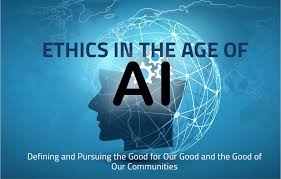Artificial Intelligence (AI) is advancing at a breathtaking pace. Back in 2018, companies allocated just 5% of their digital budgets to AI. Fast forward to 2023, and that figure has surged to 52%, according to data from Vention. AI is transforming industries, but it’s also raising significant ethical questions. As AI becomes more embedded in our lives, are we prioritizing progress at the cost of morality?
Is AI Ethical, or Is It the People Behind It?

When it comes to AI, the debate often centers on its ethicality. But according to Jonah Kollenberg, Senior AI Engineer at 4C Predictions, the question of whether AI is ethical might be misplaced.
“Arguing AI’s inherent ethicality can be compared to arguing for the morality of a calculator. AI is merely a tool, and the true question is whether the humans who build or use it have nefarious intentions. The ethicality of AI is therefore an extension of the ethics of its creators,” says Kollenberg.
4C Predictions, an AI-driven sports predictions platform, is one company that takes the ethical concerns around AI seriously. Their approach integrates transparency and accountability right from the design stage.
“We build our systems with transparency and accountability. This is not only the right thing to do, but it is good for business. Our customers need to trust that our predictions are accurate and based on reliable data. Building dishonest systems would only undermine that trust, something no company that intends to last would risk,” Kollenberg adds.
Key Ethical Concerns: Intellectual Property and Misinformation
One of the most common ethical concerns surrounding AI is the use of models trained on content—like artists’ images or journalists’ writing—without the original creators’ consent. These issues touch on intellectual property rights, prompting some AI developers to adopt internal processes to ensure ethical data sourcing and credit creators appropriately.
Additionally, large language models (LLMs), which are responsible for generating text, have come under fire for spreading misinformation. Whether it’s in casual conversations or during more serious applications like content generation, the risk of disinformation remains a pressing concern.
The Need for Legislation
For some experts, legislation is the key to addressing AI’s ethical challenges. Vignesh Iyer, another Senior AI Engineer at 4C Predictions, argues that clear laws are crucial to ensuring AI develops in a fair and ethical manner.
“Key legislative areas should include defining AI-related terms, establishing principles like fairness and privacy, and ensuring sector-specific regulations in fields such as healthcare and finance. Enforcement would rely on regulatory bodies, regular audits, penalties for non-compliance, and protection for whistleblowers,” says Iyer.
While certain companies are transparent about their AI practices—especially in sensitive areas like hiring or credit scoring—others operate with less openness. This lack of transparency can erode trust, not just with customers but also with regulators and investors. For companies that hope to succeed long-term, strong ethical governance is no longer optional—it’s essential.
AI as a Force for Good
Despite the concerns, AI has already proven itself to be a force for good in many areas. From AI-powered chatbots offering mental health support to virtual therapists guiding people through personal challenges, AI is helping to make essential services more accessible.
“AI is not only a powerful tool but also one that can be used for positive change. Already, AI has been used to improve lives and contribute to the common good. For example, AI chatbots and virtual therapists are used to offer mental health support, providing therapy guidance to individuals who may otherwise lack access to professional help,” Iyer points out.
Ethics Must Be Built In from the Start
The conversation around AI and ethics is not just about what AI is capable of today, but how we ensure it continues to be a force for good in the future. For AI to fully integrate into mainstream society, ethics can’t be an afterthought.
“Ethics must be considered from the beginning of a project, with governance measures in place throughout its lifecycle. AI will inevitably continue to shape the world, but its long-term success depends on building and maintaining systems rooted in ethical principles” Iyer concludes.
As AI continues to evolve, the ethical choices we make today will shape the future of technology—and society as a whole.




